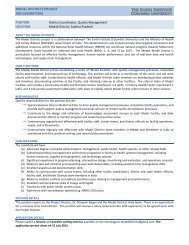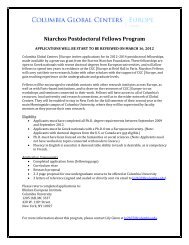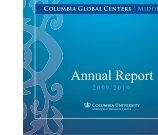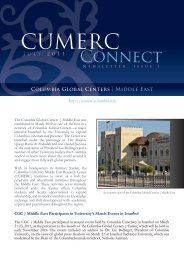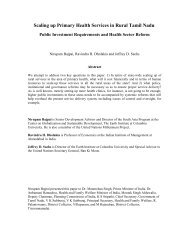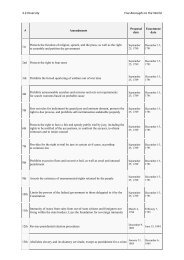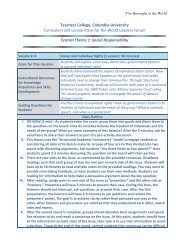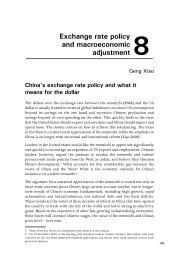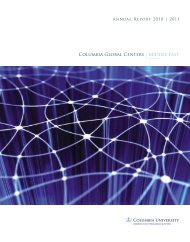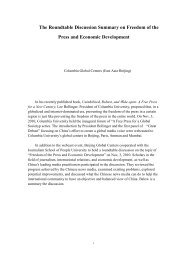Is the Renminbi the Next Global Currency, McKinsey - Columbia ...
Is the Renminbi the Next Global Currency, McKinsey - Columbia ...
Is the Renminbi the Next Global Currency, McKinsey - Columbia ...
You also want an ePaper? Increase the reach of your titles
YUMPU automatically turns print PDFs into web optimized ePapers that Google loves.
3<br />
The Quarterly: What are <strong>the</strong>se reforms and how long will <strong>the</strong>y take?<br />
Geng Xiao: China has already started a lot of its reforms. But it’s going to take anywhere<br />
from 5 to 10 years’ time, really, for China to correct its distortions—land reform, reform<br />
of <strong>the</strong> energy sector, state-owned-enterprise reform, and social welfare. During <strong>the</strong> last<br />
30 years, most of <strong>the</strong> tradable-goods prices have become more or less consistent with <strong>the</strong><br />
global price structure. Only <strong>the</strong> nontradable sectors still have a different price structure<br />
compared to <strong>the</strong> global price structure.<br />
So <strong>the</strong> nontradables are <strong>the</strong> key. And you have to understand, nontradable prices in China<br />
have to be lower than in <strong>the</strong> United States because China still is a developing country and<br />
still has low productivity. Only when <strong>the</strong> productivity of China’s nontradable sector reaches<br />
that of <strong>the</strong> United States will <strong>the</strong> two countries’ price structures converge. And that is a<br />
long process.<br />
It actually is in America’s interest to allow China to carry out structural and institutional<br />
reforms instead of exchange-rate change. Let me explain why. China is not really<br />
competing with <strong>the</strong> United States. Even if you change <strong>the</strong> exchange rate, it will have very<br />
little impact on US trade deficit because <strong>the</strong> US is going to buy from some o<strong>the</strong>r countries.<br />
US people should realize that in <strong>the</strong> past, <strong>the</strong> US production was largely for American<br />
consumers. But because of <strong>the</strong> global financial crisis, American consumers are not<br />
consuming.<br />
So in <strong>the</strong> future, <strong>the</strong> US needs to produce for consumers from emerging markets, like<br />
China. That’s <strong>the</strong> key. They need to think about what to sell to Chinese consumers—not just<br />
Chinese consumers in China but also Chinese consumers who will go out and spend in <strong>the</strong><br />
United States.<br />
The Quarterly: China is now sitting on a stash of something like $2 trillion in foreigncurrency<br />
reserves. How much larger can this get?<br />
Geng Xiao: If China actually followed <strong>the</strong> advice of <strong>the</strong> US and allowed <strong>the</strong> RMB to<br />
continue to appreciate, I would say that China will continue to increase its foreignexchange<br />
reserves, because that bubble, that expectation generated by <strong>the</strong> holding of RMB,<br />
nobody can predict. It can be $4 trillion, you know, $6 trillion.<br />
I think as time goes on, China can do a lot in terms of diversification. But <strong>the</strong>re’s a limit,<br />
because if <strong>the</strong>re is expectation on RMB appreciation, you will get even more reserves. And<br />
most of <strong>the</strong> reserves start with <strong>the</strong> US dollar, because that’s <strong>the</strong> most liquid, <strong>the</strong> most<br />
stable currency. So I don’t see that <strong>the</strong>re’s any way that China can significantly reduce its<br />
holding of <strong>the</strong> dollar assets, because <strong>the</strong> world is just basically dominated by <strong>the</strong> dollar.<br />
In that sense, you know, I don’t think <strong>the</strong>re’s much choice for China. But if pushed hard,



